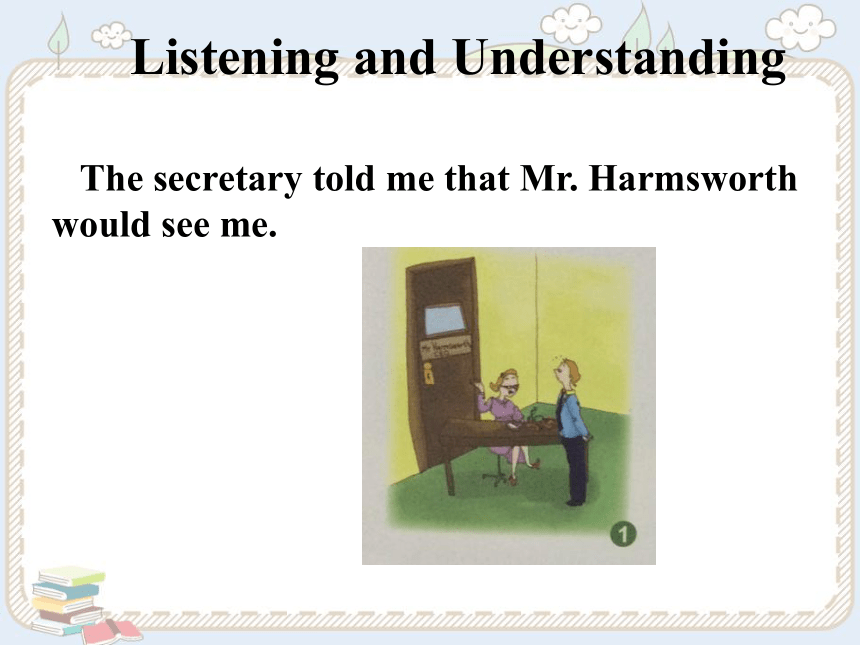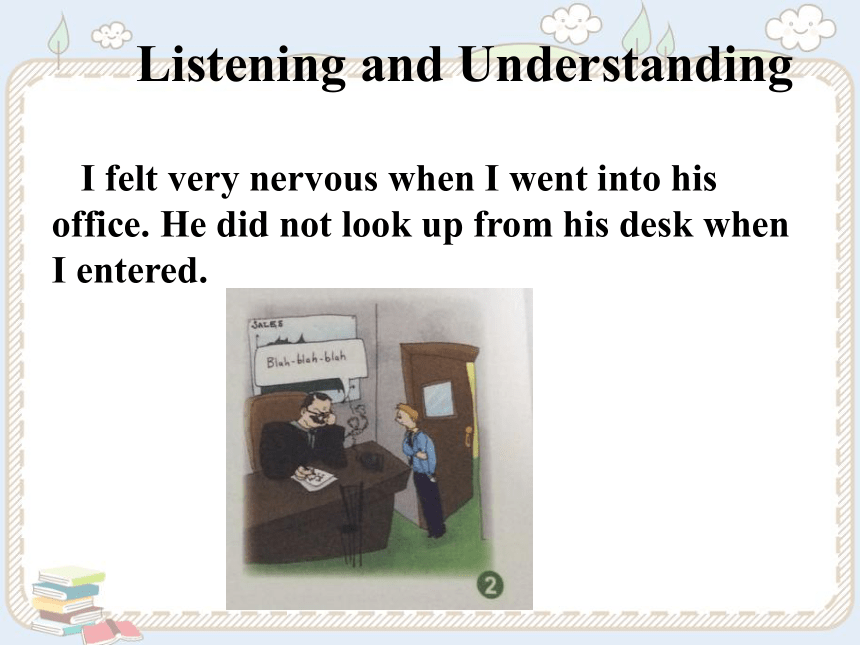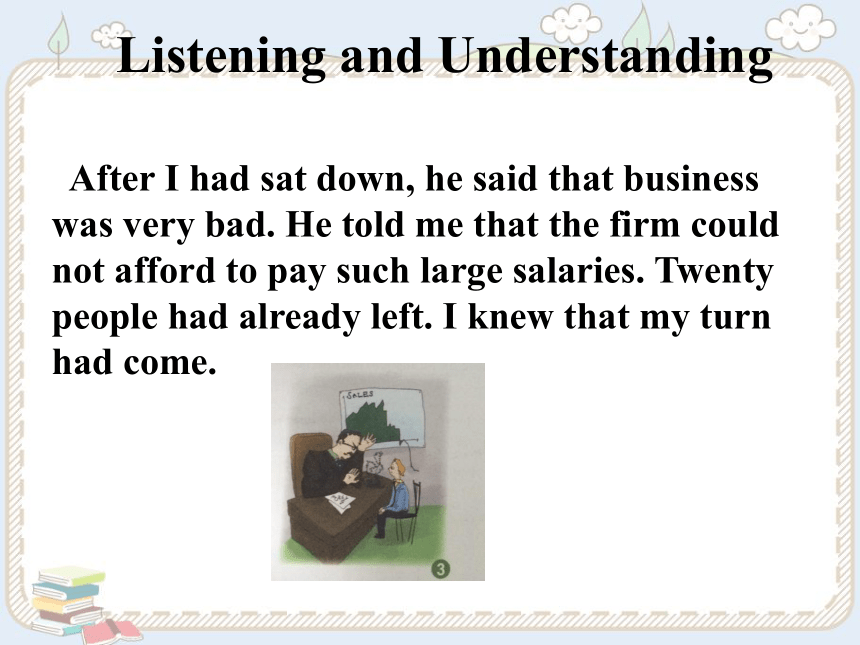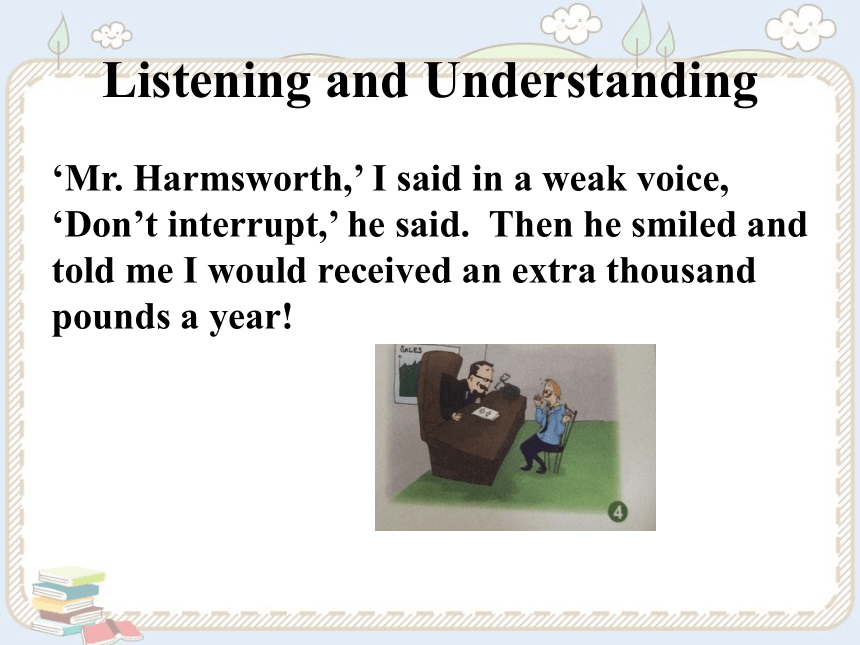新概念英语青少版4A:Unit 15 Good news! 课件(11张PPT)
文档属性
| 名称 | 新概念英语青少版4A:Unit 15 Good news! 课件(11张PPT) |

|
|
| 格式 | zip | ||
| 文件大小 | 193.9KB | ||
| 资源类型 | 教案 | ||
| 版本资源 | 新概念英语 | ||
| 科目 | 英语 | ||
| 更新时间 | 2021-01-14 11:44:46 | ||
图片预览





文档简介
课件11张PPT。Unit 15
Good News!Listening and Understanding The secretary told me that Mr. Harmsworth would see me.Listening and Understanding I felt very nervous when I went into his office. He did not look up from his desk when I entered.Listening and Understanding After I had sat down, he said that business was very bad. He told me that the firm could not afford to pay such large salaries. Twenty people had already left. I knew that my turn had come.Listening and Understanding‘Mr. Harmsworth,’ I said in a weak voice, ‘Don’t interrupt,’ he said. Then he smiled and told me I would received an extra thousand pounds a year!Guided ConversationTo Mr. Harmsworth’s office.
Very nervous.
At his desk.
That it was very bad.
After I had sat down.
Business was bad, so the firm could not afford to pay large salaries.
7. Twenty.
8. Yes, I did.
9. In a weak voice.
Guided ConversationMr. Harmsworth wanted to see me. I felt very nervous about this. I went into his office. He said that business was bad. The firm could not pay such large salaries. Twenty people had left already. He did not ask me to leave as well. He offered me an extra thousand pounds a year.Pattern Practice1 says 是一般现在时,所以其后的间接引语中的时态没有变化。注意缩略式的用法。
2 sais是一般过去时,所以其后的间接引语中的时态需要发生变化。
3 says 是一般现在时,所以其后的间接引语中的时态没有变化。第二句答句中的Dora要重读,以示与第一句话的对比。
4 said 是一般过去时,所以其后的间接引语中的时态需要发生变化。注意缩略式的用法。
Key Structuressay 和tell引导的间接引语
a 动词say和tell经常引导间接引语。Tell后面必须跟有间接宾语。而连词that并不是必须有的,可以省略,例如: He tells me (that) he’s busy.
b 时态关联的基本原则:
i 引导动词为现在时态时,间接引语没有时态的变化
ii 引导动词为过去时态时,间接引语需要有所变化:一般现在时变为一般过去时;现在完成时变为过去完成时;一般过去时变为过去完成时。但是,在口语中,一般过去时经常不发生变化,因为它通常不会引起关于动作发生顺序的误解。
Key Structuresiii 情态动词的变化:
shall/will 变为would; can变为could;may变为might
would, should, ought, might, could一般不发生变化
must一般不发生变化,除非在转述时所说的义务已经被完成,则变为had to
c 必须根据引语内容变化时间信息和代词,如
Mr. Worth: ‘I can see you tomorrow, Miss Casey.’ 变为间接引语: Mr. Worth told Miss Casey he could see her next day.
Exercises1 told would come
2 said cut
3 told had
4 did he say had done
5 did he tell bought
6 said could not
7 said worked
8 told wrote
9 did you say were
10 said would wait
Very nervous.
At his desk.
That it was very bad.
After I had sat down.
Business was bad, so the firm could not afford to pay large salaries.
7. Twenty.
8. Yes, I did.
9. In a weak voice.
Guided ConversationMr. Harmsworth wanted to see me. I felt very nervous about this. I went into his office. He said that business was bad. The firm could not pay such large salaries. Twenty people had left already. He did not ask me to leave as well. He offered me an extra thousand pounds a year.Pattern Practice1 says 是一般现在时,所以其后的间接引语中的时态没有变化。注意缩略式的用法。
2 sais是一般过去时,所以其后的间接引语中的时态需要发生变化。
3 says 是一般现在时,所以其后的间接引语中的时态没有变化。第二句答句中的Dora要重读,以示与第一句话的对比。
4 said 是一般过去时,所以其后的间接引语中的时态需要发生变化。注意缩略式的用法。
Key Structuressay 和tell引导的间接引语
a 动词say和tell经常引导间接引语。Tell后面必须跟有间接宾语。而连词that并不是必须有的,可以省略,例如: He tells me (that) he’s busy.
b 时态关联的基本原则:
i 引导动词为现在时态时,间接引语没有时态的变化
ii 引导动词为过去时态时,间接引语需要有所变化:一般现在时变为一般过去时;现在完成时变为过去完成时;一般过去时变为过去完成时。但是,在口语中,一般过去时经常不发生变化,因为它通常不会引起关于动作发生顺序的误解。
Key Structuresiii 情态动词的变化:
shall/will 变为would; can变为could;may变为might
would, should, ought, might, could一般不发生变化
must一般不发生变化,除非在转述时所说的义务已经被完成,则变为had to
c 必须根据引语内容变化时间信息和代词,如
Mr. Worth: ‘I can see you tomorrow, Miss Casey.’ 变为间接引语: Mr. Worth told Miss Casey he could see her next day.
Exercises1 told would come
2 said cut
3 told had
4 did he say had done
5 did he tell bought
6 said could not
7 said worked
8 told wrote
9 did you say were
10 said would wait
同课章节目录
- Unit 1 A private conversation
- Unit 2 Breakfast or lunch?
- Unit 3 Please send me a card
- Unit 4 An exciting trip
- Unit 5 No wrong numbers
- Unit 6 Percy Buttons
- Unit 7 Too late
- Unit 8 The best and the worst
- Unit 9 A cold welcome
- Unit 10 Not for jazz
- Unit 11 One good turn deserves another
- Unit 12 Goodbye and good luck
- Unit 13 The Greenwood Boys
- Unit 14 Do you speak English?
- Unit 15 Good news!
- Unit 16 A polite request
- Unit 17 Always young
- Unit 18 He often does this!
- Unit 19 Sold out
- Unit 20 One man in a boat
- Unit 21 Mad or not?
- Unit 22 A glass envelope
- Unit 23 A new house
- Unit 24 It could be worse
